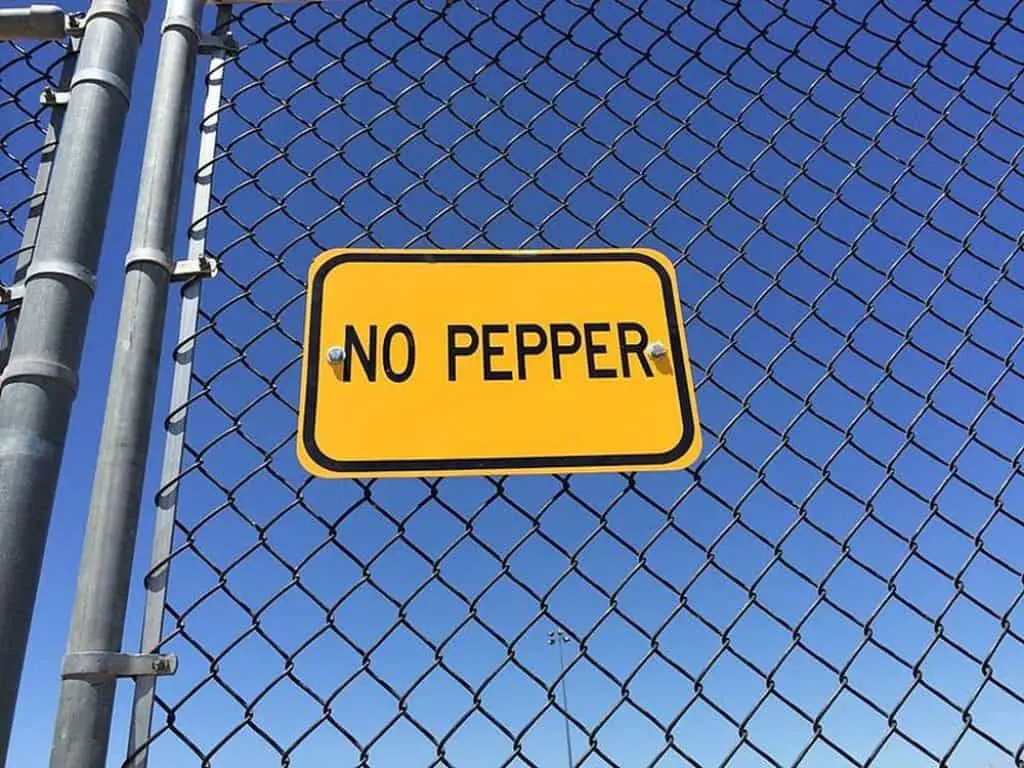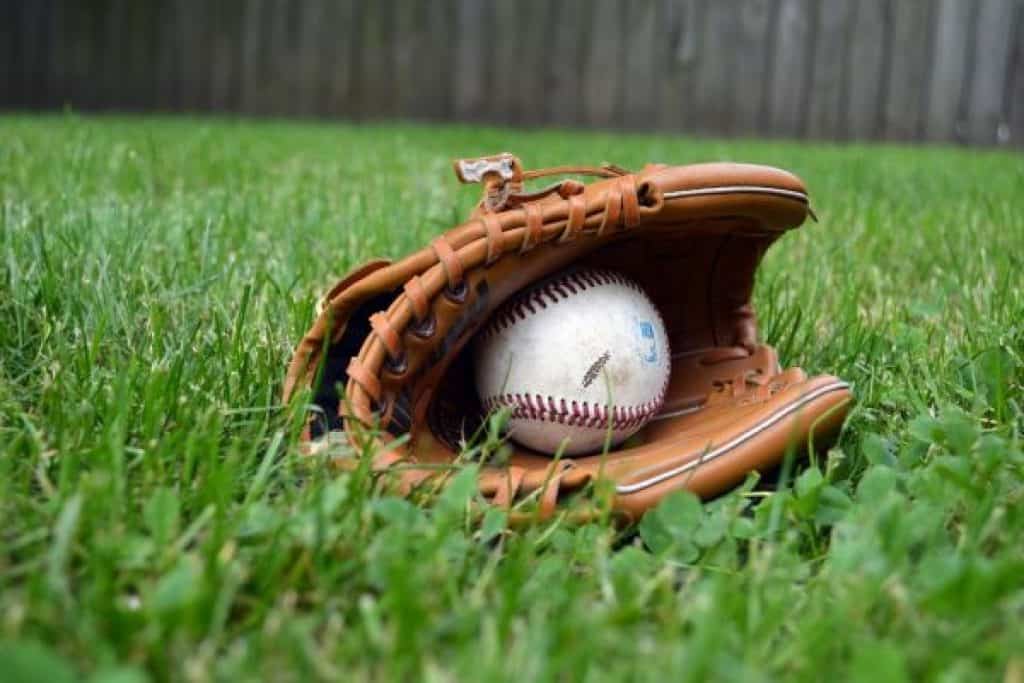What Does No Pepper Mean In Baseball? (Answered!)
Someone watching baseball for the first time will be faced with a whole distinct terminology.
Many expressions are unique to baseball and not used in any other sport.
Some terms are very understandable and easy to connect to whatever they refer to, even for someone with no previous baseball experience.
They are closely connected and clearly point to a certain play, position, or any other baseball occurrence.
However, some other baseball expressions are downright puzzling.
One of those confusing baseball terms is, certainly, pepper. Taking a trip to a ballpark anywhere on the continent, you’re very likely to see a sign saying “No Pepper.”
If you’re new to baseball, you probably won’t have a clue what it means, and most likely struggle to connect it to anything baseball-related.
Below, I’ll explain what does No Pepper mean in baseball and why is this phrase commonly seen on baseball fields.
Table of Contents
What Does No Pepper Mean In Baseball?

Pepper is a batting and fielding baseball exercise, very popular across all levels of the game.
In most cases, this game is used by players for warming up before or to keep warm during a game or practice.
In addition, it also helps develop certain baseball skills which is why it’s often practiced from the youngest age.
The exercise involves one player hitting line drives and short and sharp ground balls to a group of fielders on his team.
The fielders usually stand about twenty feet away from the hitter. They field the ball and continuously toss it back to the batter.
Pepper is useful for both batters and fielders. It keeps them sharp and helps improve reaction time and hand-eye coordination.
However, as I already said, many ballparks have signs saying “No Pepper,” meaning that the pepper game is banned at that field.
There are several reasons for this:
Fan Safety
The number one reason why pepper is not allowed at baseball fields is the number of people in the vicinity of players engaging in the game and the concern for their safety.
While playing pepper, especially during a game, there’s always the risk of wild balls flying to the stands and injuring someone.
No matter how much you love your team, nobody wants to go to the game and get injured.
Plus, there are commonly plenty of older people or kids with family at the stands who are at even more risk as they can’t avoid the flying ball that easily.
Injuries can vary from a bloody or broken nose to serious concussions.
Player Safety
In addition to the fans, players can also be at risk while playing pepper.
There have been numerous cases where a player got injured as the batter nailed a nasty line drive directly at them.
Insurance Liability
Every purchased ticket for a baseball game comes with some sort of insurance in case a fan gets injured during the game.
So, baseball field owners, who are also often team owners, are liable for any lawsuits and costs that may occur due to an injury to a spectator.
The same goes for any player that gets injured as a result of someone playing pepper.
Damage To The Field And The Stadium
Nobody opposes more to players engaging in a game of pepper than ballpark groundskeepers. It’s often said that pepper is the groundskeeper’s enemy number one.
Peeper is a rather fast-paced exercise and involves a lot of movement. Yet, it’s played in a fairly small area of the field, usually in the same spot by the dugout.
This means that players, while playing pepper, can damage the grass on the field faster than with any other exercise.
So, it’s understandable that groundskeepers, whose job is to keep the grass looking like a flawlessly maintained green carpet, are fiercely opposed to players playing pepper.
Plus, the wild balls can damage other parts of the stadium near the spot where pepper is played.
This, as well as damage to the grass field, often proves to be very costly to repair. And if the owners hate anything, it’s spending more money.
How To Play Pepper

Despite being banned from many ballparks, pepper is still a very useful exercise, that seems to have become a bit forgotten.
Nevertheless, every aspiring ballplayer should learn and try it as it will be of great help in developing and sharpening their fundamental skills.
Rules Of Pepper
Pepper is great as it’s easy to play and doesn’t require any special equipment. All you need is players, a bat, balls, and gloves.
The game starts with fielders taking positions about 20 feet away from the batter.
One of the players from the fielding group tosses the ball to the batter who hits a ground ball back at them.
If a fielder catches the ball cleanly he pitches it back to the batter as quickly as possible and this keeps on until a fielder makes an error.
Then, he moves to the back of the line, and the next fielder throws the ball.
In case a batter hits a foul ball, he loses his position, becomes a fielder, and goes to the back of the line. Also, he retires as a batter after 20 swings.
When pepper is played just for warm-up or fun, the rules are much looser.
Why Is The Game Called Pepper?
Pepper is certainly one of the most unusual terms in baseball which is why it often confuses people.
However, the story behind the name of the game is fairly simple and perfectly reasonable once you think about it.
It comes for its fast pace and the motions the batter makes when sprinkling or “peppering’ balls back to fielders.
This is similar to the way pepper is sprinkled from the shaker over the dinner plate.
Benefits Of Playing Pepper
As I said, pepper is a great exercise and brings plenty of benefits when used as a practice tool. Many coaches are big fans of the game and have their players regularly play it.
Pepper helps batter get used to live balls coming at them and improve hand-eye coordination.
As the fielders stand about 20 feet away, much closer than on the regulation field, pepper also helps hitters improve their reaction time.
This bears fruits once hitters face opposing pitchers standing 60 feet away.
Besides batters, pepper is very beneficial to fielders too. It helps them develop alertness, improve footwork, and increase agility.
In addition, pepper is very practical.
A few players can engage it in one corner of the field, while the others run different drills at the other.
It’s also fun and relaxing, playing a big role in players claiming their nerves and being more game ready.
Conclusion
As you can tell by the “No Pepper” signs around the field, the game is now rarely played during ball games.
Not so long ago, it was a common way for players to stay warmed up and sharp while waiting for their turn to bat.
It was also often a way to keep the spectators entertained.
However, despite numerous benefits of the games, concerns for the player and fan safety and potential field damage made pepper unwanted at baseball games.
Nevertheless, it’s still often played at practice grounds or used as a fun way to get some hits and throws in.




